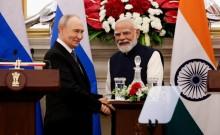All eyes will be on Sri Lanka as the country's parliamentary election results unfold on Monday as former president Mahinda Rajapaksa makes a desperate attempt to storm back into political reckoning in the island nation.
Former strongman Rajapaksa has wagered big, choosing to contest in a high-voltage election months after his defeat in the presidential polls.
The former president, who marshalled a bloody crackdown on the LTTE, suffered a shock defeat to his cabinet minister Maithripala Sirisene in January, and is hoping that the crucial election will help revive his political career.
If he carries the polls, Rajapaksa will likely become Sri Lanka's prime minister, putting him in the awkward company of Sirisene as president.
Though the electorate is majority Sinhalese, the path seems tough for Rajapaksa as Prime Minister Ranil Wickremesinghe is said to be leading in opinion polls.
Will Rajapaksa make a political comeback?
"The fight is tough. Mahinda Rajapaksa still enjoys support in Sri Lanka, but there is also a huge section of the population that wants good governance," P Sahadevan, professor at the Centre for South Asian Studies, School of International Studies at the Jawaharlal Nehru University in Delhi, told IBTimes India.
Rajapaksa, who was hailed for crushing the Tamil tigers, was also accused of rampant corruption and nepotism, which was seen as the main reason for his ouster.
"Wickremesinghe seems to have an edge over Rajapaksa in the polls, and I feel he has a better chance of winning. Whoever wins, it will be a close fight and it there will not be a huge margin in the votes," he said.
Another factor that could be a roadblock for Rajapaksa, as Professor Sahadevan pointed out, is that President Sirisena might not even nominate Rajapaksa as the prime minister if his party wins majority.
The Sri Lankan President has made it clear on several occasions that he would continue to oppose Rajapaksa.
"Mahinda Rajapaksa who lost on 8 January, will be defeated again. I will not make him the Prime Minister even if my party wins the election," Sirisena had said in a televised address last month.
Sirisena's Sri Lanka Freedom Party (SLFP) is part of the larger coalition of the United People's Freedom Party (UPFA), which has indicated that it will make Rajapaksa the prime minister if it wins the elections.
"If Sirisena rejects Rajapaksa as the prime minister, it will be a tense situation," professor Sahadevan said.
What happens if Rajapaksa becomes the Sri Lankan Prime Minister?
The more important question is if Rajapaksa does become the Srilankan Prime Minister, will he enjoy the same clout as before?
"As per Sri Lanka's constitution, the President is the chief executive, and calls the final shots. Despite the dilution of the powers of the Executive presidency with the adoption of the 19th constitutional amendment this April, the President is still powerful," Professor Sahadevan explained.
There will be no scope for a power tussle between the two, he pointed out, as the constitution has clearly laid out the roles for each.
The Independent Crisis Group, a Brussels-based conflict resolution group, however, said that if Rajapaksa comes to power, it could stall progress on 'governance reforms and reconciliation', the Colombo Page reported.
Should India be Worried?
Rajapaksa, during his rule, had made clear indications of his pro-China outlook, allowing several Chinese vessels to dock at Sri Lankan ports even at the cost of angering neighbouring India.
However, things have changed ever since his fall in January this year.
"Relations between India and Sri Lanka have normalised over the past few months, with Sirisena ensuring that the Chinese are kept at bay. India and Sri Lanka now share better understanding and more comfortable relations," the professor said.
So, should India be worried over Rajapaksa's possible comeback? Not necessarily.
"Though Rajapaksa can place constraints in India-Sri Lanka engagement, he may not be able to drastically alter bilateral relations, Professor Sahadevan said.
The Chinese, however, will be more comfortable dealing with Rajapaksa once again, he added.








